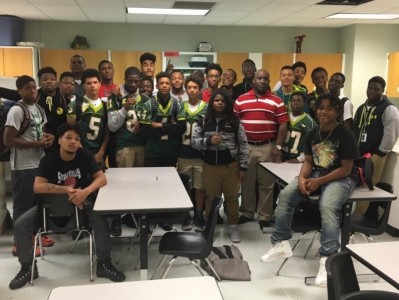Widgetized Section
Go to Admin » Appearance » Widgets » and move Gabfire Widget: Social into that MastheadOverlay zone
From Civil Rights to Human Rights: Volunteerism in Advancing Equity
The views expressed are those of the author and do not necessarily reflect the views of ASPA as an organization.
By Kelly Larson
November 1, 2016
In my first quarter article, I highlighted work occurring in Dubuque, Iowa to foster cross-sector collaboration for social sustainability through the development of a community equity profile, strategies and action plans. In subsequent columns, I addressed the role of local government in contributing toward these efforts and more specifically on local efforts that align with recommendations from the president’s Task Force on 21st Century Policing. In this column, I will focus on leveraging volunteers in supporting equity advances.
The equity profile for our community reveals disparities similar to those that exist across the country when data is disaggregated by race and by income. In 2014, Mayor Roy D. Buol signed on as an early adopter to the president’s My Brother’s Keeper (MBK) Community Challenge, hosting a community summit and developing an action plan focused on advancing equity in three areas:
1) Ensuring all youth read at grade level by third grade.
2) Ensuring all youth graduate from high school.
3) Ensuring all youth complete post-secondary education or training.
Staff’s role in the MBK initiative has been to facilitate connections between community-wide initiatives through the Community Foundation of Greater Dubuque and on-the-ground programs through nonprofit organizations. An additional focus has been on the ways in which community volunteers can be part of supporting the efforts of institutions.
Examples of volunteers working to advance equity in grade level reading include:
- Teachers from neighborhood schools volunteering to tutor students participating in the Dubuque Dream Center’s Academic Support Center.
- A local barber offering free haircuts to children who read to him while getting their hair cut at a largely volunteer-run event called the Back to School Bash, whose efforts were supplemented this year by nonprofit partners providing youth with reading materials reflecting the diversity of our community.
- AmeriCorps Members serving in local schools to improve reading scores and attendance.
- College students and adults serving as tutors and mentors supporting summer learning with Campaign for Grade Level Reading partner St. Mark Youth Enrichment.
Examples of volunteers working to advance equity in high school graduation and college/career readiness include:

- A group of African-American men who are engineers, information technology specialists, corporate managers, college faculty, high school administrators, and government staff and who donate more than 300 hours a year to supporting youth through:
- Mentoring students of color at two local high schools through monthly sessions focused on building and defining respect, building a sense of unity and historical pride, and emphasizing the importance of education.
- Delivering an annual program called the Manhood Project designed to provide education, motivation and skill-building for young men ages 12-18.
- Encouraging higher education by taking students to local colleges for campus tours that involve discussions with current students, information on financial aid, and selecting majors and extra-curricular activities.
- Supporting employment readiness through “Road to Success for Teens,” a program designed to provide youth 12-18 years old with foundational skills on navigating the employment cycle, including writing an effective resume, conducting a successful interview, wearing proper interview attire, developing leadership skills and business startup.
- Community volunteers who support Future Talk, a summer program for youth ages 13-18 that includes eight weeks of work for a stipend, along with community service projects.
Certainly, there remains much work to be done and volunteers must be supported by institutions with the resources to sustain meaningful and effective programs. Nonetheless, Dubuque has begun to leverage the power of community to ensure that youth of all backgrounds have the opportunity to succeed.
Author: Kelly Larson serves as the human rights director for the City of Dubuque, Iowa. She has degrees in law and psychology from the University of Iowa, and an intercultural professional certificate from the Institute on Intercultural Communication. She can be reached at [email protected].


Follow Us!